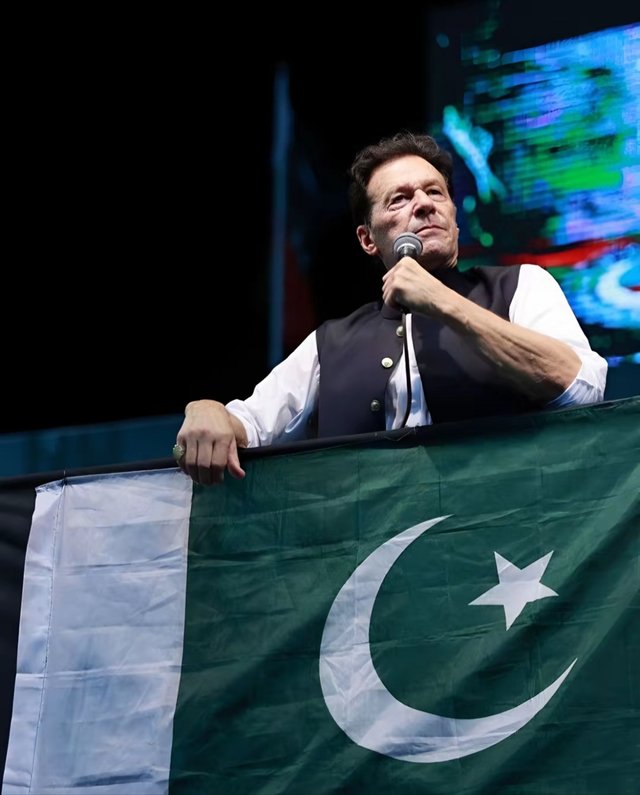The King Khan👑
Imran Khan
prime minister of Pakistan
Also known as: Imran Ahmad Khan Niazi
Written and fact-checked by
Last Updated: Aug 13, 2024 • Article History
Recent News
Aug. 12, 2024, 12:10 PM ET (New York Times)
Pakistan’s Ex-Spy Chief, an Imran Khan Ally, Is Arrested
Imran Khan (born October 5, 1952, Lahore, Pakistan) is an antiestablishment politician in Pakistan who in 2022 became the first prime minister (2018–22) to be removed by a parliamentary vote. He rose to fame as a cricket player who led Pakistan’s national team to a Cricket World Cup victory in 1992. He later entered politics as a critic of government corruption in Pakistan, although he faced corruption charges of his own in 2022 after falling out with the politically powerful army.
Early life and cricket career
Imran Khan
Imran Khan
See all media
In full: Imran Ahmad Khan Niazi
Born: October 5, 1952, Lahore, Pakistan (age 71)
Title / Office: prime minister (2018-2022), Pakistan
Founder: Pakistan Tehreek-e-Insaf
Political Affiliation: Pakistan Tehreek-e-Insaf
Awards And Honors: Cricket World Cup (1992)
Khan was born into an affluent Pashtun family in Lahore and was educated at elite schools in Pakistan and the United Kingdom, including the Royal Grammar School in Worcester and Aitchison College in Lahore. There were several accomplished cricket players in his family, including two elder cousins, Javed Burki and Majid Khan, who both served as captains of the Pakistani national team. Imran Khan played cricket in Pakistan and the United Kingdom in his teens and continued playing while studying philosophy, politics, and economics at the University of Oxford. Khan played his first match for Pakistan’s national team in 1971, but he did not take a permanent place on the team until after his graduation from Oxford in 1976.
Cricket bat and ball. cricket sport of cricket.Homepage blog 2011, arts and entertainment, history and society, sports and games athletics
Britannica Quiz
Cricket Quiz
By the early 1980s Khan had distinguished himself as an exceptional bowler and all-rounder, and he was named captain of the Pakistani team in 1982. Khan’s athletic talent and good looks made him a celebrity in Pakistan and England, and his regular appearances at fashionable London nightclubs provided fodder for the British tabloid press. In 1992 Khan achieved his greatest athletic success when he led the Pakistani team to its first World Cup title, defeating England in the final. He retired that same year, having secured a reputation as one of the greatest cricket players in history.
After 1992 Khan remained in the public eye as a philanthropist. He experienced a religious awakening, embracing Sufi mysticism and shedding his earlier playboy image. In one of his philanthropic endeavours, Khan acted as the primary fund-raiser for the Shaukat Khanum Memorial Cancer Hospital, a specialized cancer hospital in Lahore, which opened in 1994. The hospital was named after Khan’s mother, who had died of cancer in 1985.
Entry into politics
Imran Khan and Pakistan Tehreek-e-Insaf (PTI)
Imran Khan leading supporters of his party, Pakistan Tehreek-e-Insaf (PTI), in a protest against Pervez Musharraf, Lahore, Pakistan, February 24, 2008.
After his retirement from cricket, Khan became an outspoken critic of government mismanagement and corruption in Pakistan. He founded his own political party, Pakistan Tehreek-e-Insaf (Pakistan Justice Movement; PTI), in 1996. In national elections held the following year, the newly formed party won less than 1 percent of the vote and failed to win any seats in the National Assembly, but it fared slightly better in the 2002 elections, winning a single seat that Khan filled. Khan maintained that vote rigging was to blame for his party’s low vote totals. In October 2007 Khan was among a group of politicians who resigned from the National Assembly, protesting Pres. Pervez Musharraf’s candidacy in the upcoming presidential election. In November Khan was briefly imprisoned during a crackdown against critics of Musharraf, who had declared a state of emergency. The PTI condemned the state of emergency, which ended in mid-December, and boycotted the 2008 national elections to protest Musharraf’s rule.
In spite of the PTI’s struggles in elections, Khan’s populist positions found support, especially among young people. He continued his criticism of corruption and economic inequality in Pakistan and opposed the Pakistani government’s cooperation with the United States in fighting militants near the Afghan border. He also launched broadsides against Pakistan’s political and economic elites, whom he accused of being Westernized and out of touch with Pakistan’s religious and cultural norms.
